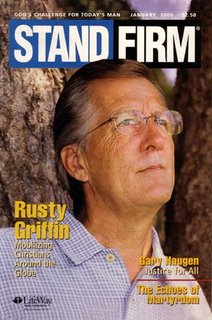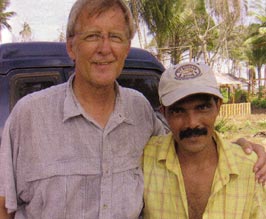Profile: Rusty Griffin
 Editor's Note: Reprinted with permission from Stand Firm, January 2006. Griffin is a former staff member of the Brotherhood Commission.
Editor's Note: Reprinted with permission from Stand Firm, January 2006. Griffin is a former staff member of the Brotherhood Commission.Rusty Griffin
Mobilizing Christians to fulfill the Great Commission
By Ken Carver
Grim reports of intensifying death and destruction filled the newswires on Monday, December 27, 2004. An Indian Ocean tsunami had struck the coasts of many Asian countries the day before, and the phone was ringing in Rusty Griffin’s Memphis, Tenn., office.
The caller said that the pastor of a Memphis area church wanted to travel with his wife to the devastated coast of Indonesia soon—the following Sunday! An impossible request, most would have thought, considering the challenge of getting a Christian pastor and his wife into this Muslim country—especially into an area suddenly devoid of infrastructure.
For Rusty Griffin, it was the beginning of another “Mission Impossible” adventure—the kind that seems to characterize his career.
Cutting through administrative red tape, Griffin met the impossible time factor and helped pave the way for 262 volunteers from 39 churches to minister to the hurting people of Indonesia within 10 weeks. Such is the nature of the work God has called Griffin to do.
Rusty Griffin is vice president of Global Ministries Foundation and executive director of the foundation’s Global Access Network.
God designed Griffin to be a cutting-edge kind of guy. “I don’t ever want to do the ‘maintenance work,’” he says. “Once someone says, ‘I’ve got this idea. Do you think it’ll work?’—If I can buy into it, I’ll make it work. Once I get it up and running and do it twice, that’s it. Then we’re into maintenance work.” He affirms the necessity of maintenance work, but prefers to leave that job to someone else.
Christlike is his watchword. It peppers his conversation. Making disciples is his passion.
“I went to college and seminary with the goal of wanting to help [people] really understand what it means to live out a Christian life—not just join a church, but to transfer their salvation experience into a lifestyle. That was my calling, to help people develop a lifestyle of being Christlike,” says the 58-year-old Memphis native.
Griffin’s life purpose remains remarkably unchanged from those early days. His world, however, is much larger.
 A Vision for the World
A Vision for the WorldSoon after the September 11, 2001, terrorist attacks and the subsequent military action in Afghanistan, Griffin was ministering there, paving the way for volunteer teams to follow. Working through a secular organization, he was instrumental in bringing high-level Afghan government leaders to the United States to begin a dialog that included the Christian gospel message.
When tribal civil war broke out in Rwanda—bringing horrible suffering to millions—Griffin coordinated the work of 12 teams of doctors and nurses that ministered to refugees confined to two volcano craters in neighboring Zaire (now called the Democratic Republic of Congo) for 11 weeks. “This was one of those, ‘it can’t be done,’ kind of things,” he says.
When the Soviet Union began to disintegrate, Griffin met with the first Southern Baptist missionary to re-enter Moscow. The result was that he coordinated the collection, shipment and distribution of 144 metric tons of food and cooking supplies to hungry families living in high-rise apartments there. The effort included leading 17 teams—over a 34-week period—to work side-by-side with persecuted Russian Christians to divide and distribute the commodities.
Rusty was the first youth minister at First Baptist Church of Vicksburg, Miss. He led the church’s first volunteer mission trip, a trip to south Texas. He then moved on to work for the Mississippi Baptist Convention Board, where he revitalized Royal Ambassador camping in Mississippi and started the convention’s disaster relief program.
Later, Griffin was employed by the now dissolved Brotherhood Commission of the Southern Baptist Convention. There he met head-on the challenge of involving high school students in missions. The highly successful World Changers organization—which began in the early 1990s—was the result.
Two thoughts drove the founding of World Changers. The first was, “To create a missions program that a church’s youth minister could have ownership in, so he would become the missions person. That was the primary consideration,” according to Griffin. “The other thing was knowing that if we want high school guys involved in missions, we’re going to somehow have to include high school girls (and vice versa)!”
World Changers’ first project in 1991, in Brightsville, Tenn., involved 112 teenagers from six churches, plus their adult leaders. It has grown to the point where it is now international in scope, and participation is capped at 22,000 students each summer! To date, almost 300,000 youth have participated in the week-long construction projects. Lives changed: countless!
About World Changers, Griffin says, “Roofing, insulation, wheelchair ramps, painting—sure it’s about changing someone else’s life and sharing Christ in the process. But the reality is, we’re trying to change the teenagers, to help them become more Christlike.”
His current career direction began when God opened the door for him to direct a private Christian foundation, evaluating and funding mission-related projects. Soon Griffin had the organization conducting medical missions in countries closed to traditional Christian missions. That work led directly to his current job with Global Ministries Foundation.
Through all the changes and more than 40 years after God touched his heart with His call to ministry, Rusty Griffin continues to pursue that call, “to help people develop a lifestyle of being Christlike.”
--
The Changing Face of Missions
Rusty holds strong, specific opinions regarding future Christian mission endeavors. He often refers to the “10/40 Window,” that part of the globe bordered roughly by the 10th and 40th degree north parallels, especially where they lie across the Middle East and Far East.
“The great majority of the world’s poorest people still have no access to the gospel,” he says, “and most of those life within the 10/40 Window with no Scripture written in their language. Traditional missionaries and traditional methodology will not reach these people.
“Farmers, computer technicians, doctors, engineers, educators and such will reach them because they have the skills that the rest of the world is looking for. Traditional missionaries will best serve as enablers for volunteers to reach the unreached people groups.
“To be more Christlike has never been more critical for the average lay person. We’re down to the point where it’s going to take the people who have been paying for others to go, to go do it themselves. We can no longer pay people to ‘do’ Christianity for us.”
Ken Carver is a freelance writer who lives in Collierville, Tenn.
